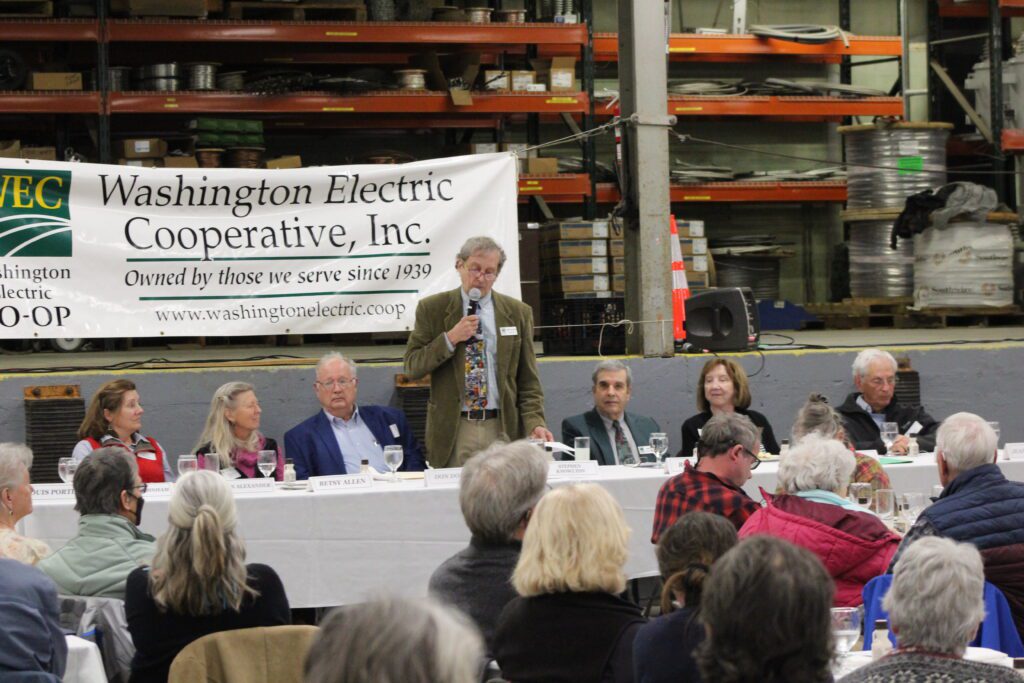Storms and an equitable energy future discussed at first in-person Annual Meeting since 2019

The Annual Meeting took place in WEC’s Operations Center, where a few dozen transformers were ready for deployment. Most were ordered in 2020, and only just delivered after three years tied up in the supply chain. Members, staff, and guests mingled and enjoyed farm-to-table dining from Sugarsnap Catering. Lieutenant Governor David Zuckerman, Vermont Broadband Commission executive director Christine Hallquist, and Energy Action Network executive director Jared Duval were a few of several policy and energy leaders present. Kyle MacDonald from Capstone talked with members about low-cost weatherization opportunities, and Paul Lambert from Efficiency Vermont handed out free energy-saving kits stocked with LED light bulbs.
Officers’ reports
Knowlton reflected on the importance of gathering as the members and co-owners of a community electric utility. Looking toward a changing energy future and WEC’s role in distributing electricity, Knowlton said he’s proud that even before he joined the Board, WEC worked to provide renewable electric power “to all its members, equitably, and to assign cost of service equitably.” He continued, “It’s crucial as WEC members we strive to share the risk and reward equitably. That’s why we own the thing.”
Don Douglas was blunt in his report as Treasurer. “2022 was a difficult financial year for the Co-op,” he said, because construction at the Coventry landfill limited gas production, and the Co-op was forced to buy power when market prices were high. The rate increase that took effect in November is still under regulatory review, but Douglas reported it would be lower than the 14.9% requested. Members will be refunded the percentage point difference on bills paid during review. Net positive margins at the end of 2022, and a satisfactory three-year average, satisfied WEC’s lenders, just barely, said Douglas. When WEC has net positive margins, he reminded members, the money is returned to the Co-op’s membership over time in the form of capital credit refunds. The $9.4 million WEC has returned over 25 years “almost adds up to all the rate increases we’ve had since 1998,” he said.
General Manager Louis Porter brought up Winter Storm Elliott, the 2022 major storm that caused regionwide outages and left some members without power for a week over the December holidays. Leading the Co-op through the storm, he said, taught him two things. “First, WEC needs to–and is–doing everything it can to improve our reliability and our communication with members,” he said. Second, “It’s also incumbent on all of us to help educate folks who have moved to our territory that living in a rural part of the world is just different. It just is.”
Q&A
Though members can ask questions directly of WEC leadership anytime, the Annual Meeting question and answer session allows members to hear and consider each other’s questions. It’s an important tradition.
Sandal Cate asked for a storm checklist to be published in a fall issue of Co-op Currents. The checklist is published annually. In 2022, it arrived in the December issue, in the middle of the outage, a little late for most members to use it.
Goddard Graves also requested a reminder in this newsletter that members contact the Co-op if an individual in their household has special medical needs and is endangered by a long-term outage. Porter agreed that it’s helpful for the Co-op to have updated information about members’ special needs.
Graves also complimented WEC’s lineworkers. “I’ve climbed a few poles myself,” he said, and given the difficulty of restoring power in recent winter storms, “there are no English words for my admiration” for the crews and their work. The room broke into applause.
Kathleen Osgood asked what Co-op leaders envisioned for the future of solar power. It’s a big topic, answered Porter, so he zeroed in on two points. “What I hope for the future is we get better at how we manage and build solar resources and integrate them into the grid to be effective and helpful even to those who don’t own them.”
Porter continued, “I’ll also tell you my fear: that we become a two-grid system” where those with means are able to generate and store their own power, and those without means are connected to a grid that is overpriced and suffers frequent outages. The essence of a cooperative, he said, is to try to reach the first vision, and to avoid the second vision.
Knowlton added that his vision of the future of solar involves pairing solar generation with battery storage.
Responding to another question about incentives for battery storage, Porter informed the membership that WEC is one in a cohort of utilities applying for grants for battery storage. But as far as subsidizing individual battery storage systems, he said, Co-op leadership has long held that the full membership should not pay for the cost of an individual member’s investment. Changing that policy, he explained, could cause a regressive cost shift, where members with lower-incomes help pay for residential upgrades that only members with higher incomes can access.
Former Board President Michael Duane asked about the Co-op’s worker safety record. WEC has a stellar safety record, replied Porter, and after many years without an accident, in 2022 a lineworker was injured during Winter Storm Elliott. He has since recovered completely. “When I heard he was able to walk under his own power, it was the the greatest Christmas present I could have gotten,” reflected Porter.
